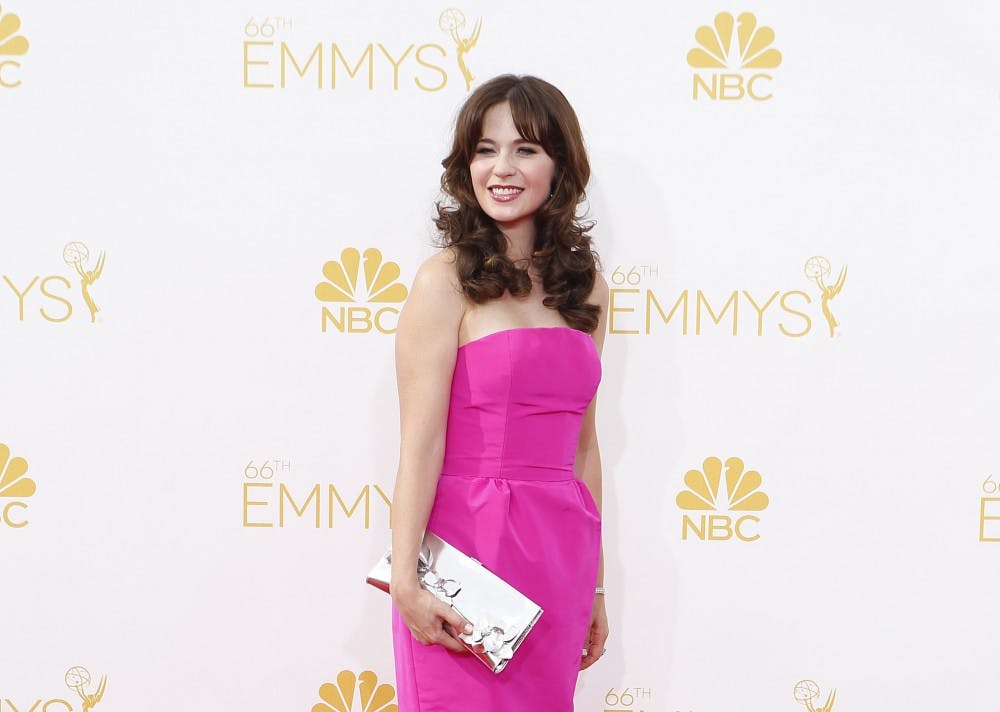“I brake for birds. I rock a lot of polka dots. I have touched glitter in the last 24 hours … And that doesn’t mean I’m not smart and tough and strong.”
The FOX show “New Girl” is not only one of the funniest programs on TV today, but it also deserves more credit for its feminist wins and gender representations of femininity and masculinity.
The show debuted in 2011 and centers around Jessica Day, a quirky teacher who breaks up with her lowly boyfriend and moves in with male roommates. Schmidt is the flamboyantly lovable marketing mogul. Nick is the clueless, burly bartender with a heart of gold. Winston is the goofball police officer, and Coach is the suave yet tender jock. Jess’ “adorkability” is accented by her sleek model best friend Cece, with whom Schmidt is infatuated.
Zooey Deschanel, who plays Jess, is also a producer on the show. Her twirly skirts, dreamy doe eyes and whimsically childlike disposition have drawn criticism. But make no mistake: Deschanel is a brash and bold feminist.
As Jess, Deschanel takes the misconception that femininity is weak and crushes it under her ballet flat. In season one, she stands up to a lawyer who rolls her eyes at Jess’ love for baking and baby animals, giving us the quote at the beginning of this article.
Over the course of the show, we see the female characters fretting over their biological clocks and getting distracted by cats. But we also see Jess ask for a promotion (and get it) and Cece casually express a progressive attitude toward sexuality.
The female characters have their fair share of conflict, but they confide in each other for support and don’t engage in the catty stereotype of female friendship. Jess is the star of the show, with a dynamic range of human emotions and motivations, not just a side character to help advance the development of a man.
Women watching “New Girl” can find positive role models in Jess and Cece.
Hattie Hayes is a senior at ASU who is involved with the local Phoenix feminist comedy scene. She performs stand-up comedy and researched the show “New Girl” for a film class.
“They’re both, for all of their faults and flaws, very levelheaded,” Hayes said of the show's female stars. “They both make decent decisions. They’re not just the standard bumbling blonde … It’s these tropes that we’ve seen in the last fifty years of television, and now they’re finally being broken down.”
Hayes said “New Girl” breaks gender barriers by applying common female tropes to men.
“You have Zooey Deschanel, who very much plays the standard manic pixie dream girl, but you also see different characteristics of her that are sort of fragmented and applied to the men in the show,” Hayes said.
Schmidt, for example, lives in a fantasy world of pressed suits and shiny loafers. He dreams big, and his lofty ambitions and metrosexual quirks often elicit eye rolls from his roommates.
Additionally, when the men on the show try to display their masculinity or engage in traditionally hyper masculine activities, it usually ends in embarrassment or realizations that they don’t need to love motorcycles and beer to be “real men.”
In season four, Jess goes out of town and the men rejoice over the idea of a “guys night,” which quickly devolves into doing laundry, drinking pink wine and talking about their feelings.
One of the running jokes of the show is the “douchebag jar,” a container the men drop money into when a roommate calls him out for doing something obnoxious or sexist. The presence of the douchebag jar creates a world in which the men are shamed for doing something distasteful and have to physically pay a toll for their offensive behavior.
Although diversity is about more than a quota, “New Girl” does a fairly good job. The main cast has just as many people of color as white actors. There are gay characters, from Jess’ more comically exaggerated lesbian gynecologist friends to the casual appearance of two dads when Jess meets her boyfriend Sam’s parents. Season four even touched on race relations as Winston tried to educate Nick.
Diversity and positive representations are crucial in television and make for better comedy, Hayes said.
“Having that representation helps change the tone,” she said. “It means that people who are misogynistic or racist or otherwise reveal deeply held prejudices within their comedy, they won’t be tolerated.”
The male characters often objectify women, but with swift redemption. For example, Schmidt’s constant eroticization of Cece’s Indian heritage is more effective at proving he’s a tool rather than genuinely degrading Cece’s character. The show even points out double standards. When the girls make the “walk of shame” in season four, Jess remarks, “Why do women have to have a label for going home in the morning, when for men it’s just going home?”
Like anything, “New Girl” isn’t a perfectly feminist show.
But it’s damn near close.
Reach the columnist at lallnatt@asu.edu or follow @LibbyAllnattASU on Twitter.
Like The State Press on Facebook and follow @statepress on Twitter.
Editor’s note: The opinions presented in this column are the author’s and do not imply any endorsement from The State Press or its editors.
Want to join the conversation? Send an email to opiniondesk.statepress@gmail.com. Keep letters under 300 words and be sure to include your university affiliation. Anonymity will not be granted.




